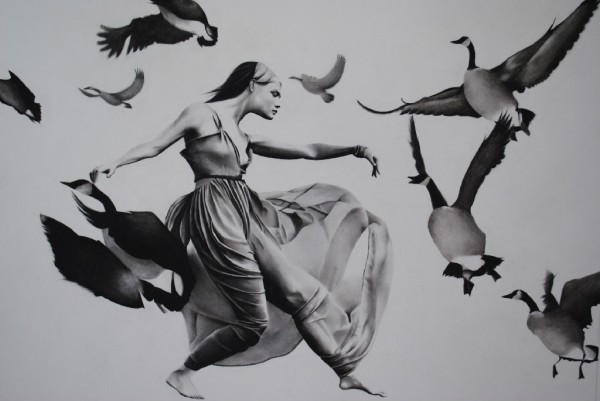Matthew Murrey
Child Sobbing at the Library
Suddenly the quiet, that empty jug,
is being filled
with crying. A child is sobbing: not the wailing
of a slapped kid,
and not the tearful screeching of demands
and whining. No,
it is a child crying for something lost
or broken, something
that will never be replaced.
I listen, loving
the sound, as I love a lone violin
or muted trumpet
slowly filling the bowl of silence.
It is the crying
that I’ve lost, and will never have
again. I want
that child to cry and cry for everything
I’ve lost, every love
I’ve squandered, everything I should’ve
done. Cry for
my deaf father sitting hunched
in front of his loud TV,
for the house on Kenmore Street, for the tea
we drank, falling in love,
for the novels I’ll never read, for the great
paintings hanging unseen
all night in empty museums, for the cities
of the world—all
their joyful streets, all their terrors—
for the dead and the way
time shoves us along, ignoring every
protest. Cry child,
and let it be the song, trapped beneath
this flat bone,
here where my ribs come together.

Constellations
I was close. A little snow
on the ground. Stars
out. No moon. The sky laughed
so faintly I barely heard it
and cupped my ears to be sure.
It came again—a little louder:
geese. I’d never seen them after dark,
but recalled a poem by Jimmy Carter:
on the roof of the White House
one night he heard
and watched a string of geese
crossing our capital’s starless sky.
I looked up to see,
and soon they passed over me:
a handful in loose formation leading,
then a trailing line,
then the honking V coming last.
They numbered about thirty,
high up and dimly lit by ground light;
they were like faint stars,
like a constellation on the move,
sliding south and west of Orion
so the trailing V crossed the V of Taurus’ horns.
Then I lost them, but could still hear
their calling out to one another.
That sound usually leaves me sorry
for myself, wanting to fly away,
yet going nowhere; but tonight
hearing them high in the dark, flying far
in this freezing air, made me happy
to be walking down here, almost home.

Clichés
Good God, not another wild geese poem!
I’ve had it with flight
and song, longing and restraint,
arriving and going away.
But I’ll forgive you, if you forgive me.
I confess: I’ve done the same—yes,
poems with geese walking like sisters,
rising like sinners, stroking, like swimmers,
the high, clear air.
Beware sunsets, falling leaves,
full moons—and geese.
And yet, don’t all of us begin
roughing out some little poem
when we hear them honking overhead?
Why, look at you
standing there gazing up, gawking,
as a noisy V of them passes
over you—yes, you, silly goose.

The Music Box
I hope it lasts as long as you
are able to open and wind it
as long as your ears can hear
the tune ringing from its tiny teeth.
If we stay together, I hope
you’ll smile whenever you open it.
I hope you’ll open it again and again
and hear the daring sentiment of my heart.
And if we are apart, I hope you’ll wind it
sometimes and listen, and love
the spare simplicity of the wooden box;
love the ringing tone of the metal comb
as the little notched drum turns against it.
I hope you’ll feel sad for how small it is,
how it plays only one shortened tune.
 Matthew Murrey’s poems have appeared in various journals such as Tar River Poetry, Poetry East, and Rattle. He has received an NEA Fellowship in Poetry, and his first book manuscript is seeking a publisher. He worked as a mental health clinician for many years but is now a high school librarian. He lives in Urbana, Illinois with his partner; they have two grown sons who live in the Pacific Northwest.
Matthew Murrey’s poems have appeared in various journals such as Tar River Poetry, Poetry East, and Rattle. He has received an NEA Fellowship in Poetry, and his first book manuscript is seeking a publisher. He worked as a mental health clinician for many years but is now a high school librarian. He lives in Urbana, Illinois with his partner; they have two grown sons who live in the Pacific Northwest.






Leave a Reply